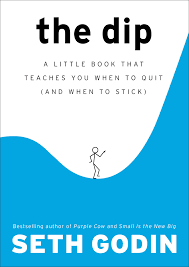![]()
“A woodpecker can tap twenty times on a thousand trees and get nowhere, but stay busy. Or he can tap twenty-thousand times on one tree and get dinner.” – Seth Godin, The Dip: A Little Book That Teaches You When to Quit (and when to stick).
I quit. All the time. I have been quitting things for as long as I can remember. I quit baseball to play football. I quit accounting to major in finance. I quit education to get an MBA in marketing. I quit blues harmonica to learn acoustic guitar. I quit a private sector job to serve in a public sector one. I quit foods with added sugar to cook more at home. I quit Facebook for Twitter. The list seems endless, so I’ll quit now. I have more writing to do! Ha.
Quitting Isn’t Wrong
We are all taught from a young age that quitting is bad, wrong, and we shouldn’t do it. Ever. “Winners never quit and quitters never win”, “never give up”, and “don’t be a quitter” are words we here often, especially in competitive events. Why did we get that stern advice? Because our parents and other caring adults wanted us to learn to persevere, to stick with something long enough to finish it. That’s not a bad lesson to learn. There are times when quitting does make sense, and other times when pushing through to the finish is the right thing to do. How do we know the difference?
Quitting (or not!) as a Strategy
When does quitting something make sense? When it’s no longer fun? Too hard? Taking too much time to finish? Maybe. Sometimes. Quitting does make sense when you’re making a choice. I had the opportunity to see the classic Rogers and Hammerstein play, Sound of Music, at the incomparable Ordway just before Christmas. I bet the leads in the musical, Billie Wildrick as Maria Rainer and Dieter Bierbrauer as Captain Georg von Trapp, had to quit a lot of other things to become great at acting and singing. Was that wrong? Not based on the performance I attended!
Quitting makes sense when you try and try and nothing changes. Things don’t get better, or worse. They stay the same. Ever had a job like that? Are you still working it, or did you quit? That’s just one example. Here’s another: quit when the short term pain of staying the course far outweighs the long term benefit of completing the task/project/event. Remember, that is a choice.
We don’t have to quit. We may choose to push through some tough times to finish. It is hard to miss fun school events to practice lines for a musical. Being on stage for the applause cures a lot of short-term pain: if you choose to push through and not quit. That’s the beauty of choice. Be discerning in what we choose, and what we don’t pursue.
How might we focus our efforts if we embrace quitting as a strategic choice? Are there long-suffering projects or initiatives that you’d quit? Committee work that is dragging you down? We all get the same 24 hours in a day. How might you spend your time if you chose to quit something, to focus the time on something else? You can’t be the best at everything. You can’t accomplish everything. Find the things with a great enough long term benefit that they are worth your limited time.
See You Later (not quitting!)
My time as a featured blogger here on GovLoop.com has come to an end. This is my last official post. The editors and staff at GovLoop.com are awesome. If you haven’t yet applied to be a featured blogger, check out this link! I highly recommend the experience. You can easily quit something else, and make room for writing here.
Let’s keep in touch! You’ll find me on my division’s Twitter @CI_Minnesota, my personal Twitter @GibsonMN165, publishing monthly on LinkedIn, and occasionally posting here on GovLoop.com.
Thanks for reading!
– Joe
Book Recommendation
“Winners quit all the time. They just quit the right stuff at the right time.” Want to learn more about Strategic Quitting? Check out this book:

Joe Raasch is part of the GovLoop Featured Blogger program, where we feature blog posts by government voices from all across the country (and world!). To see more Featured Blogger posts, click here.





This makes a lot of sense to me now, but not when I was growing up and my parents stated the same thing, “Quitters never win.” I said those same things to my own children all the time, until one day my thirteen yoear old daughter said to me, “Mom it is okay to quit this bad marriage to my Dad.” For this first time I didn’t see quitting in the same light. I don’t know if it was the words or who they came from that made the difference and called me to action. Since then, I have mad huge accomplishments in my life academically, professionally, spiritually, and my health improved also. Quitting isn’t such a bad thing as long as you fill the gap withty positiviy which bring great benefits!
This makes a lot of sense to me now, but not when I was growing up and my parents stated the same thing, “Quitters never win.” I said those same things to my own children all the time, until one day my thirteen year old daughter said to me, “Mom it is okay to quit this bad marriage to my Dad.” For this first time I didn’t see quitting in the same light. I don’t know if it was the words or who they came from that made the difference and called me to action. Since then, I have made huge accomplishments in my life academically, professionally, spiritually, and my health improved also. Quitting isn’t such a bad thing as long as you fill the gap with positivity which bring great benefits!
Sorry I corrected some erros in my spelling.
Hi Lily,
Thanks for sharing this powerful personal example! Whatever we end up doing in life at/outside of work, is a series of choices.
I love how relatable this post is. I think it is important to know when it’s okay to quit and when you should see things through. You are completely right when you say growing up we heard our parents or other caring adults told us to never quit, but I agree when you say “quitting makes sense when you try and try and nothing changes.” I do believe we should try our hardest and finish what we promised and committed to, but when you know it’s time to move on, you should move on. Thanks for a thought-provoking final post!
HI Katarina,
Thank you for your comment! There is definitely some art and some science to ‘quitting’. The hardest part is giving ourselves permission to act.